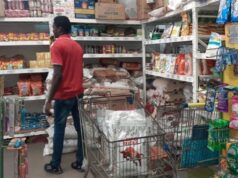THUR, MAY 17 2018-theG&BJournal–LAST TIME OUT, when it surfaced in Nigeria in 2014, it was a big scary struggle to contain the deadly disease. We were lucky. It didn’t kill as many people as it did in most other African countries. But it did cost the country quite a lot in terms of trauma and resources deployed in our usual fire-brigade approach to dealing with complicated matters. The disease is back again, currently ravaging the Democratic Republic of Congo (DRC).
Today, the World Health Organisation (WHO) confirmed one new case of Ebola virus disease (EVD)in Wangata, one of the three health zones of Mbandaka, a city of nearly 1.2 million people in Equateur Province in northwestern Democratic Republic of the Congo.
It is important to note that Ebola is a complicated problem and complicated problems generally do not yield a simple solution. It is even more complex when faced with the question of how to confront the challenge posed when it surfaces in a country not equipped with the type of resources required for effective response.
The health authorities’ early response of placing on high alert the nation’s seaports, airports and land borders is a great deal the right first step to take but it does not supply the final answer. What it does is to spread the responsibility for finding the appropriate response mechanism beyond various health institutions in the country. This in itself is not enough.
The preparedness of the federal government and the federal ministry of health to accept the burden of scaling up investments in preventing and treating chronic diseases as well as responding to epidemics is always vital if any credible way forward on tackling communicable and noncommunicable is possible. Its success or failure also will depend ultimately on how solemnly the many health agencies in the country are willing to accept the weighty charge.
While the latest outbreak in DRC has the potential of spreading to Nigeria, there has to be binding mechanism ‘already’ in place for achieving immediate halt or elimination of a larger treat. In this regard, there has to be a very well defined EBOLA action plan available and accessible to every Nigerian. It will include action set out by the 36 states of the federation that could deliver the cumulative result protecting every single Nigerian. These must be accompanied by assessment of past and current progress, compiled according to a common reporting standard that permits comparisons to be drawn.
This will create the appropriate framework also, for regular reviews and guidelines for deploying appropriately resources for preventing imminent and future risks. It will also enable the embedding of transparent information exchanges and regular dialogue among state health ministries and the federal government and stakeholders as well. That way new norms of behaviour are established, whereby health authorities in the country not only strive to meet targets, but also set more demanding ones.









